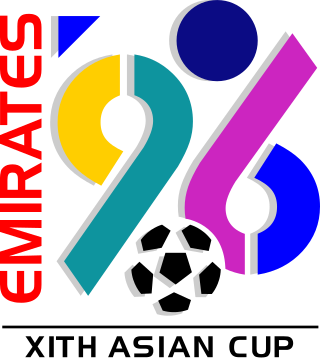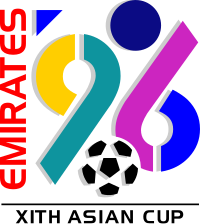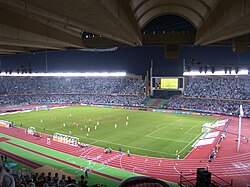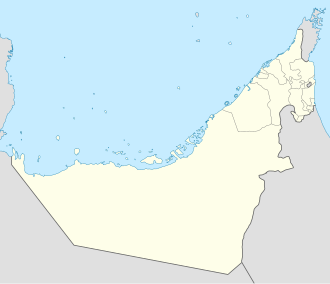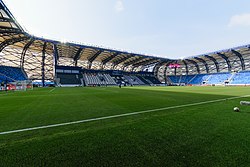Top Qs
Timeline
Chat
Perspective
1996 AFC Asian Cup
International football competition From Wikipedia, the free encyclopedia
Remove ads
The 1996 AFC Asian Cup was the 11th edition of the men's AFC Asian Cup, a quadrennial international football tournament organised by the Asian Football Confederation (AFC). The finals were held in the United Arab Emirates between 4 and 21 December 1996. Saudi Arabia defeated hosts United Arab Emirates in the final match in Abu Dhabi. As the runners-up, the United Arab Emirates represented the AFC in the 1997 FIFA Confederations Cup as the winners Saudi Arabia had qualified automatically as host.
Remove ads
Qualification
Summarize
Perspective
33 teams participated in a preliminary tournament. It was divided into 10 groups and the first-placed team of each group thus qualified.
The qualifying teams were:
Notes:
- 1 Bold indicates champion for that year
- 2 Italic indicates host
Remove ads
Squads
Tournament summary
Summarize
Perspective
The tournament began with host United Arab Emirates against South Korea in group A, where the Emiratis played in a 1–1 draw. Subsequently, Kuwait was surprisingly held to a draw by Indonesia, the lead even being taken by the Indonesians. However, the United Arab Emirates, Kuwait and South Korea eventually established their position, with South Korea finishing in third place due to losing to Kuwait and inferior goal difference and qualified only as one of two best third-placed teams, while the host comfortably seized first place, leaving Indonesia bottom after two consecutive defeats to South Korea and the UAE.
Group B easily saw Saudi Arabia, Iran and Iraq took three leading places in their group, with both teams managed to beat Thailand, which finished bottom with three defeats, and also each three of them suffered one defeat one to another. Iraq only finished third due to inferior goal difference, but qualified as the best third-place finisher.
Meanwhile, group C was more entertaining, with both three last finishers grabbed one win each only. Debutant Uzbekistan, on its just first ever competitive participation of a major tournament and was regarded low, stunned entire of Asia by beating China with two late goals to gain three points in the team's just first competitive match. Defending champions Japan however emerged as the only team to collect all three victories, while China recovered following the defeat to beat Syria. The Syrians grabbed its only win, a 2–1 win over Uzbekistan, but the team's poor performance, with two defeats to Japan and China, cost the team from reaching the quarter-finals. Uzbekistan finished last despite the win over China, and was eliminated as well.
The quarter-finals saw entire of East Asia slumped out. Defending champions Japan was crushed down by Kuwait, China lost after a seven-goal thriller with Saudi Arabia, while South Korea suffered a denting 2–6 loss to Iran, with Iran scored five goals in the second half. The host UAE continued its quest to win the trophy with a successful 1–0 win over Iraq thanked for the golden goal of Abdulrahman Ibrahim. The semi-finals became a West Asian affair and rematches of group A and B: Saudi Arabia took a successful revenge on Iran following the group stage, beating the Iranians on penalty, while the UAE killed Kuwaiti dream for the second time with another 1–0 win to set up final with Saudi Arabia. Iran eventually took third place after beating Kuwait on penalty, the match ended 1–1 draw.
The final between the UAE and Saudi Arabia happened to be boring than expected. The two teams played defensively and lacking enthusiastic attacks in front of 60,000 spectators. Eventually, penalty had to be brought out, where the UAE missed two while Saudi Arabia only missed one, thus Saudi Arabia was crowned for its third trophy in the country's fourth consecutive Asian Cup final.[1] Thanked for the win, Saudi Arabia gained automatic berth to qualify for the 2000 AFC Asian Cup held in Lebanon.
Remove ads
Venues
First round
Summarize
Perspective
All times are UAE time (UTC+4)
Group A
Group B
Source: RSSSF
Group C
Source: RSSSF
Third-placed qualifiers
At the end of the first stage, a comparison was made between the third placed teams of each group. The two best third-placed teams advanced to the quarter-finals.
Source: RSSSF
Iraq (best third-place) and South Korea (second best third-place) qualified for the quarter-finals.
Remove ads
Knockout stage
Summarize
Perspective
All times are UAE time (UTC+4)
| Quarter-finals | Semi-finals | Final | ||||||||
| 15 December – Abu Dhabi | ||||||||||
| 1 | ||||||||||
| 18 December – Abu Dhabi | ||||||||||
| 0 | ||||||||||
| 1 | ||||||||||
| 15 December – Al Ain | ||||||||||
| 0 | ||||||||||
| 2 | ||||||||||
| 21 December – Abu Dhabi | ||||||||||
| 0 | ||||||||||
| 0 (2) | ||||||||||
| 16 December – Dubai | ||||||||||
| 0 (4) | ||||||||||
| 2 | ||||||||||
| 18 December – Abu Dhabi | ||||||||||
| 6 | ||||||||||
| 0 (3) | ||||||||||
| 16 December – Abu Dhabi | ||||||||||
| 0 (4) | Third place | |||||||||
| 4 | ||||||||||
| 21 December – Abu Dhabi | ||||||||||
| 3 | ||||||||||
| 1 (2) | ||||||||||
| 1 (3) | ||||||||||
Quarter-finals
Semi-finals
Third place play-off
Final
|
| |||||||||||||||||||||||||||||||||||||||||||||||||||||||||||||||||||||||||||||||||||||||||||||||||||||||||||||||||||||||||||||||||||||||||
Remove ads
Statistics
Summarize
Perspective
Goalscorers
With eight goals, Iran's Ali Daei is the top scorer of the tournament. In total, 80 goals were scored by 47 different players, with one of them credited as an own goal.
8 goals
6 goals
4 goals
3 goals
 Hwang Sun-Hong
Hwang Sun-Hong Hassan Saeed
Hassan Saeed
2 goals
1 goal
 Gao Feng
Gao Feng Ma Mingyu
Ma Mingyu Li Bing
Li Bing Peng Weiguo
Peng Weiguo Mehrdad Minavand
Mehrdad Minavand Naeim Saadavi
Naeim Saadavi Hussam Fawzi
Hussam Fawzi Khalid Mohammed Sabbar
Khalid Mohammed Sabbar Kazuyoshi Miura
Kazuyoshi Miura Hiroshi Nanami
Hiroshi Nanami Naoki Soma
Naoki Soma Takuya Takagi
Takuya Takagi Ko Jeong-Woon
Ko Jeong-Woon Shin Tae-Yong
Shin Tae-Yong Bashar Abdullah
Bashar Abdullah Badr Haji
Badr Haji Hani Al Saqer
Hani Al Saqer Khalid Al-Muwallid
Khalid Al-Muwallid Ali Cheikh Dib
Ali Cheikh Dib Dusit Chalermsan
Dusit Chalermsan Kiatisuk Senamuang
Kiatisuk Senamuang Abdulrahman Ibrahim
Abdulrahman Ibrahim Saad Bakheet Mubarak
Saad Bakheet Mubarak Khamis Saad
Khamis Saad Sergey Lebedev
Sergey Lebedev Oleg Shatskikh
Oleg Shatskikh Igor Shkvyrin
Igor Shkvyrin
1 own goal
 Hassan Abbas (for Japan)
Hassan Abbas (for Japan)
Awards
Best player
Top scorer
Best goalkeeper
Fair play award
Team of the Tournament[2]
Remove ads
Marketing
Sponsorships
References
External links
Wikiwand - on
Seamless Wikipedia browsing. On steroids.
Remove ads
